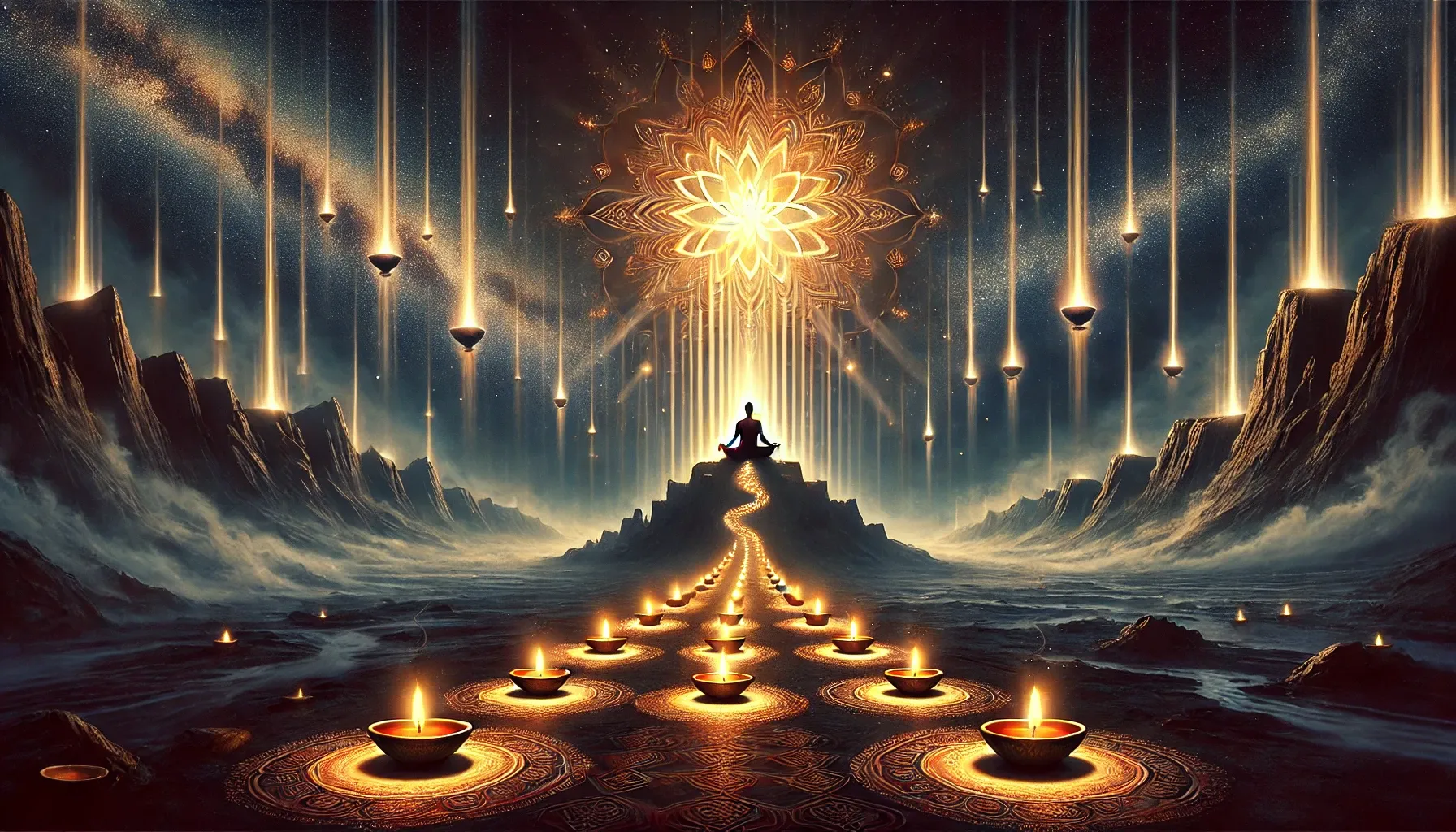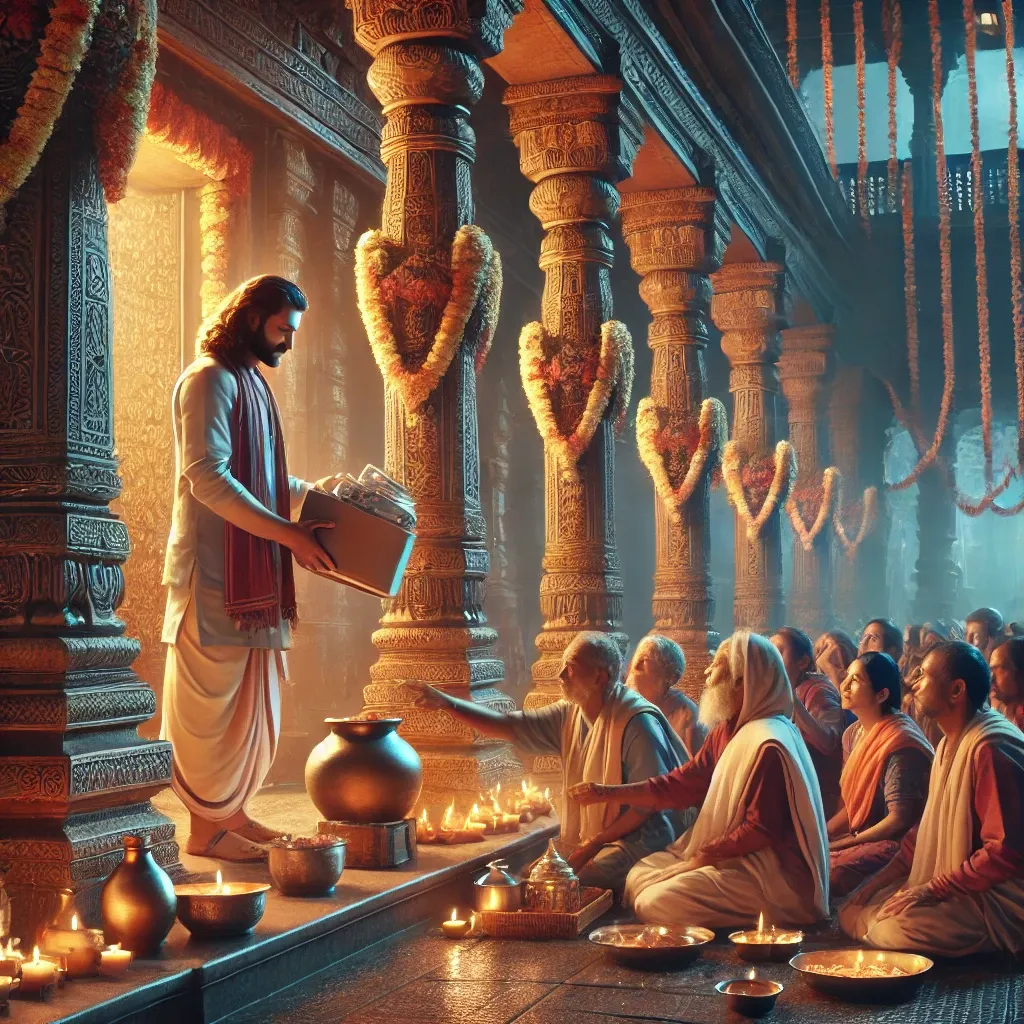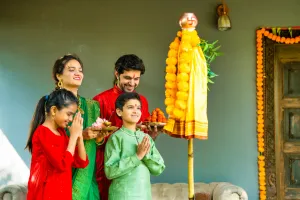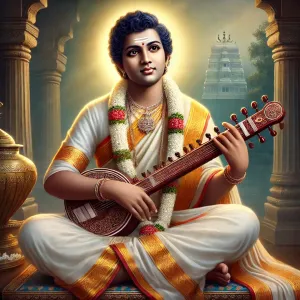Diwali is one of the most joyous occasions in Indian culture. It represents the festival of lights and celebrates cultural heritage, spiritual values, and human refinement. The word 'Diwali' is a shortened form of the Sanskrit word 'Deepavali,' which translates to a row of lights. This aesthetically beautiful illumination has roots that trace back to the era of Lord Ram, one of the most revered forms of God in the Hindu culture.
According to the Ramayan, one of India's greatest epics, Shree Ram was exiled from his kingdom of Ayodhya due to the political intrigues by Queen Kaikeyi. His exile, which lasted for fourteen long years, plunged the citizens of Ayodhya into deep sorrow. However, when Shree Ram finally returned victorious after defeating the demon king Ravan, the people of Ayodhya were so overjoyed that they illuminated their homes and streets with oil lamps to celebrate his return. This tradition of lighting lamps to dispel darkness and celebrate the triumph of good over evil has been carried on for generations, becoming the cornerstone of the Diwali festival.
However, Diwali is not merely a Hindu festival; it is celebrated by different communities in India, each attributing unique significance to it. The festival is rich with traditions that convey spiritual messages beyond the outer symbolism of lights and festivities.
Cultural and Spiritual Significance Across Religions
Hindu Tradition
For Hindus, Diwali primarily celebrates the return of Lord Ram to Ayodhya. It symbolizes the victory of light over darkness, knowledge over ignorance, and good over evil. Diwali is also dedicated to the worship of Goddess Lakshmi, the goddess of wealth and prosperity. Hindus believe that by lighting lamps, cleaning homes, and wearing new clothes, they invoke the goddess to bless their homes with fortune and abundance.
Jain Tradition
For Jain communities, Diwali is celebrated as Mahavir Nirvan Jayanti, marking the day that Lord Mahavir, the last Tirthankara, attained enlightenment or nirvana. This day represents the ultimate release of the soul from the cycles of birth and death, making it an important spiritual event for Jains.
Sikh Tradition
For Sikhs, Diwali holds special significance as Bandi Chhor Divas, the day when Guru Hargobind, the sixth Guru, was released from imprisonment by Mughal Emperor Jahangir. It marks a day of liberation and the triumph of righteousness over oppression, echoing the universal Diwali theme of the victory of light over darkness.
Other Traditions
In some parts of India, Diwali is celebrated as Naraka Chaturdashi, the day when Shree Krishna and his wife Satyabhama defeated the demon Narakasura, thus reaffirming the spiritual message that good always triumphs over evil.
The Essence of Culture in Festivals
Festivals like Diwali are more than mere rituals; they are a celebration of a community's shared values and beliefs. Culture, in its essence, is a set of common reference points that people regard as excellence in behavior, ethics, morality, arts, and education. When a community passes down these values from one generation to the next, it enriches its members by uplifting them from base tendencies toward higher human refinement.
The Hindu culture, one of the oldest living cultures in the world, encapsulates this essence of refinement and wisdom. Diwali, with its rich traditions and spiritual symbolism, celebrates not just the return of Shree Ram to Ayodhya but also the inner journey of every individual toward truth, knowledge, and spiritual enlightenment.
How to Celebrate Diwali with a Spiritual Focus
While Diwali is traditionally celebrated with lights, sweets, and fireworks, its deeper essence lies in its spiritual significance. The citizens of Ayodhya celebrated the event by welcoming Shree Ram back into their lives. Similarly, we can use this occasion to welcome the divine into our hearts, symbolizing the return of light and wisdom into our consciousness.
Light, as we know, is a universal symbol of knowledge, wisdom, and truth. Darkness, on the other hand, symbolizes ignorance. Diwali should not only be about dispelling external darkness but also about addressing the inner darkness that often clouds our minds—ignorance, greed, anger, and material attachment. By lighting the lamp of true knowledge and wisdom, we can dispel these negative tendencies.
A Metaphor for Life: The Story of the Owl and the Swan
A meaningful story in the Indian tradition is the tale of the owl and the swan, which serves as a metaphor for how different people perceive knowledge and ignorance. In the story, an owl claims that it is night even when it is midday because its large eyes are blinded by the light. The swan, representing wisdom, argues that it is indeed day, but the owl refuses to believe. This story illustrates that perception is subjective, and what may be light to one may be darkness to another. Shree Krishna, in the Bhagavad Gita (2.69), echoes this sentiment when he says, "That which is day to the enlightened is night to the ignorant."
This story is a reminder that many people live in a state of ignorance, believing themselves to be wise. Like the people of Ayodhya who welcomed Shree Ram back into their lives, we too must strive to bring the divine light of wisdom and knowledge into our hearts, thus moving from ignorance to truth.
The Jungle of Worldly Existence

A well-known analogy in Indian philosophy is that of the jungle representing worldly existence. Just as one can become lost in a jungle, people often lose themselves in the materialistic pursuits of life. Disease, old age, and death are like the animals that chase us as we grow older, while desires and attachment keep us bound to material pleasures. Yet, the small joys of life, like honey dripping from a beehive, make us forget our precarious situation and we tend to savor the temporary material pleasures.
Diwali provides an opportunity to reflect on our lives and realize that, much like the man dangling over a pit in the jungle, we are all precariously positioned in life, constantly being pursued by time and mortality. The light of Diwali symbolizes the wisdom that can help us navigate this jungle and lead us toward the truth.
Moving Toward the Light of Truth

The famous Sanskrit prayer "Asato Ma Sada Gamaya, Tamaso Ma Jyotir Gamaya, Mrityor Ma Amritam Gamaya" translates to: "Lead me from untruth to truth, from darkness to light, from death to immortality." Diwali is a perfect time to meditate on this prayer and work toward spiritual enlightenment. It is not enough to light lamps on the outside; we must also light the lamp of knowledge within our hearts.
Why are we often enveloped by the darkness of ignorance and suffering? The answer is simple: it is our forgetfulness of God. In the material world, we often lose sight of our true purpose, becoming engrossed in the transient pleasures of life. Diwali serves as a reminder that we need to reorient our lives toward the divine light of wisdom.
Cleaning the Heart Along with the Home

A common custom during Diwali is to clean and decorate our homes to welcome Goddess Lakshmi, the symbol of wealth. However, it is also essential to clean our hearts from the dust of ignorance, grudges, and impatience. Just as we meticulously clean our homes for the festival, we must also examine our hearts to ensure that they are pure and welcoming for the divine to reside.
In this sense, wealth is not just material but also spiritual. While we pray to Goddess Lakshmi for material prosperity, we should also seek the spiritual wealth that will carry us beyond this life into eternity.
Tallying Our Spiritual Accounts

Traditionally, Diwali is a time for business people to settle their accounts for the year. On a deeper level, it is also an excellent opportunity to reflect on our spiritual accounts. Just as we tally our profits and losses, we should examine our karmic balance—our actions, thoughts, and deeds. Are we living a life that aligns with our higher purpose, or are we accumulating spiritual debt?
Scriptures advise us to give away a portion of our wealth in charity to purify the remaining wealth. Similarly, we must share our spiritual wealth with others by helping them on their journey toward enlightenment.
Conclusion
As we celebrate Diwali this year, let us not only partake in the external festivities but also use the occasion as an opportunity for spiritual growth. Diwali symbolizes the triumph of light over darkness, not just in the physical world but also in our inner lives. By welcoming the divine light into our hearts, we can dispel the darkness of ignorance and find true joy, wisdom, and eternal love.
In this way, every day can become a Diwali—a day of spiritual celebration and enlightenment. As Shree Krishna says in the Bhagavad Gita (9.27), "Whatever you do, whatever you eat, whatever you give away in charity, do it all as an offering to me."[SM1] Let us imbibe this spirit and make every action in our lives a service to the divine.
Frequently Asked Questions (FAQs)
Q1. Why is Diwali celebrated?
Diwali is celebrated to commemorate the return of Shree Ram to Ayodhya after his exile, symbolizing the triumph of good over evil and light over darkness. It also holds significance for other religions, such as Jainism and Sikhism, each attributing its unique meaning to the festival.
Q2. What is the spiritual significance of lighting lamps during Diwali?
Lighting lamps during Diwali symbolize the dispelling of ignorance and the triumph of knowledge and truth. It is a reminder to seek the inner light of wisdom and spiritual enlightenment.
Q3. How can one celebrate Diwali in a spiritually meaningful way?
Apart from the traditional customs of cleaning homes, wearing new clothes, and distributing sweets, one can celebrate Diwali spiritually by introspecting, cleaning the heart of negative emotions, and inviting divine wisdom into one’s life.
Q4. What is the importance of charity during Diwali?
Charity during Diwali is a way to purify wealth and express gratitude for the blessings one has received. It also serves as a reminder to share our spiritual and material wealth with those in need.
Q5. How does Diwali relate to the concept of karma?
Diwali is an excellent time to reflect on one's actions and karmic balance. Just as business people settle their accounts, individuals can assess their deeds and ensure they are living a life aligned with spiritual principles.
Resources
· The Light of Divine Knowledge, JKYog’s 2023 Issue of E-Journal Samarpan.



